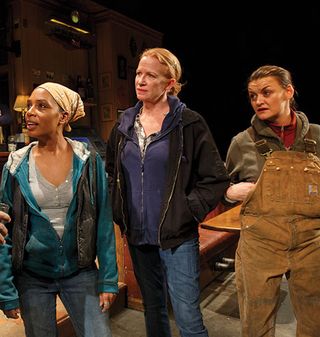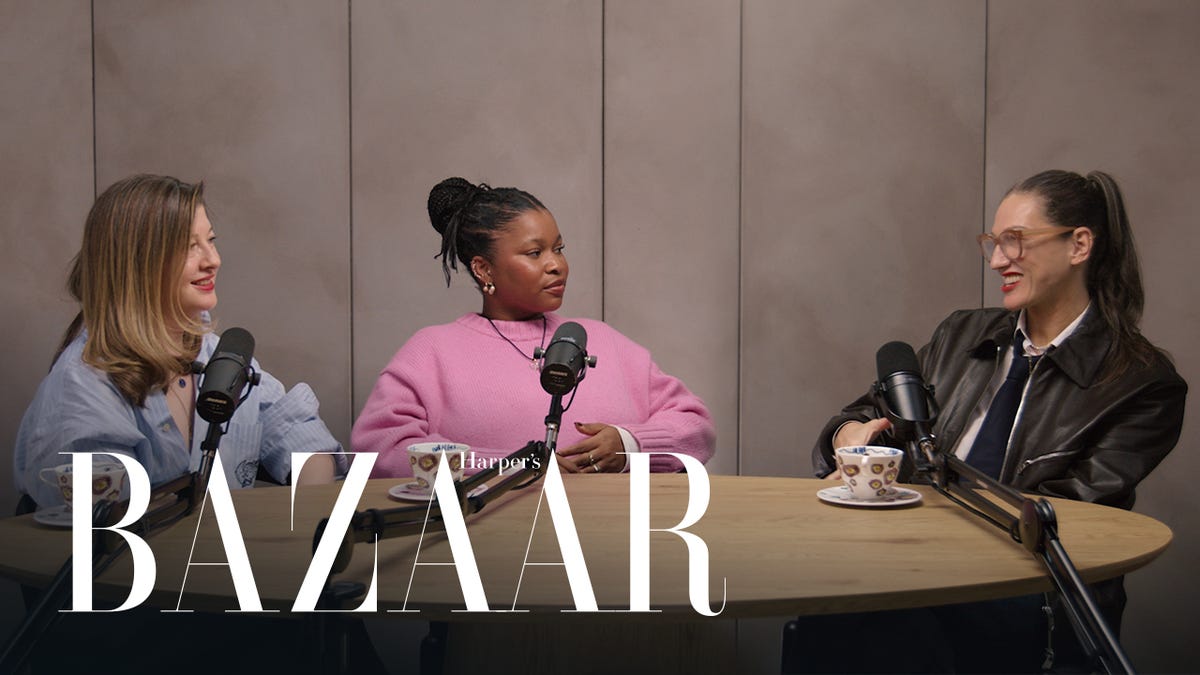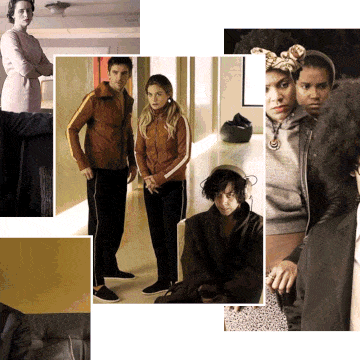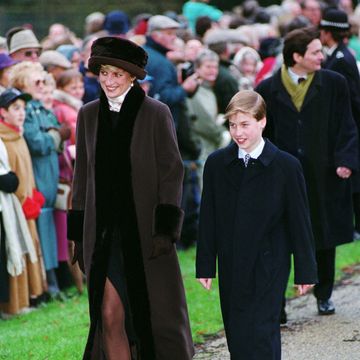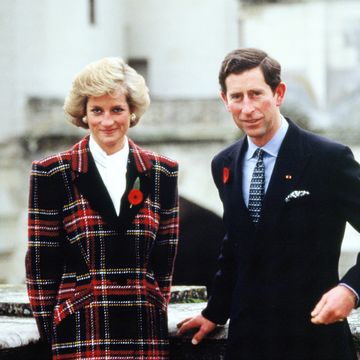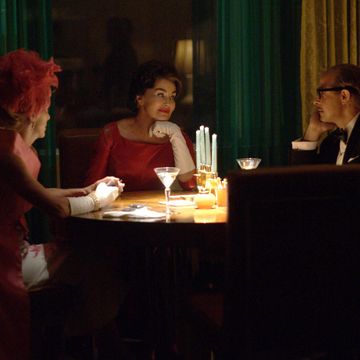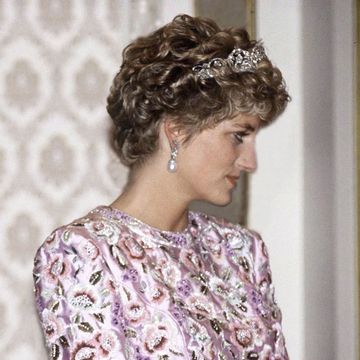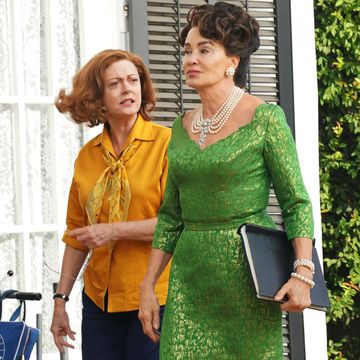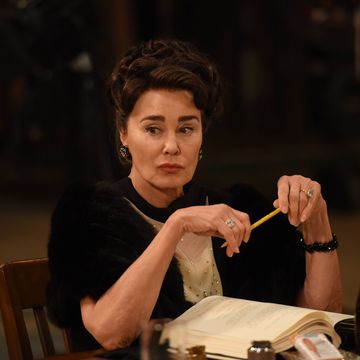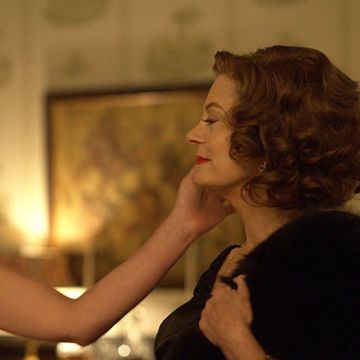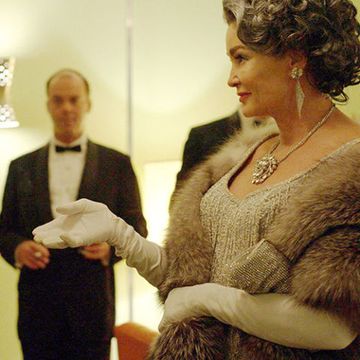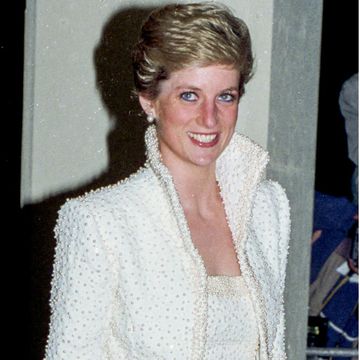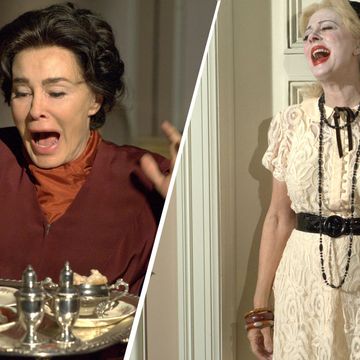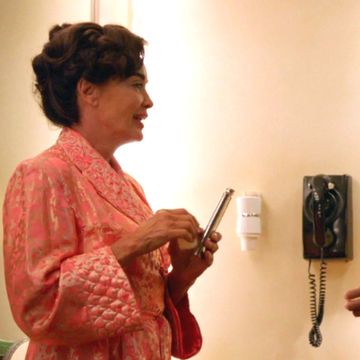For three episodes of Feud: Bette and Joan, Pauline, director Bob Aldrich's tireless, eternally perky assistant, has been relegated to the background, often addressed by a degrading "honey" and forced to answer Aldrich's phone—despite proving her worth multiple times over (she brought the damn What Ever Happened to Baby Jane? script to him in the first place!). But in tonight's episode, having helped Aldrich make Baby Jane a success, Pauline steps to the forefront with a script of her own. She wants to be a director, and knows she can pull it off. Finding an ally in Joan Crawford's steely housekeeper Mamacita, Pauline takes the script to Joan, who immediately shuts her down in a stomach-churning speech: "Men were given the bullhorn, and I can't say that we're any worse off for it." Unfazed, Pauline moves on to Aldrich, who promises to produce it for her—that is, until problems with his current picture (naturally, he landed a job right after shooting Baby Jane) lead him to demand Pauline face reality: "Even if you didn't pick the shittiest time possible, I'm not a miracle worker," he barks at her. "No one is gonna let a woman direct a picture. You're in fantasy land."
Any woman watching that scene will recognize herself in Pauline in that moment—expecting recognition for an achievement, only to see it given to a man, or bringing an idea to the table and having it brutally rejected. Even worse, the scene mirrors the ugly truth of Hollywood today, where only four percent of the biggest films of the last decade were directed by women. Actress Alison Wright, who plays Pauline, certainly recognized her own experiences with sexism in that moment, and the fact that this episode was shot during the election only compounded the reality of how little progress women have made professionally in the 55 years since Baby Jane was released. "Pauline has a line of something like, 'Men find it off-putting, the idea of a woman in charge.' There was a certain feeling when I said that line, because I thought Hillary Clinton was going to be our president the next day," says Wright. "I was so proud of how far we've come and how that doesn't apply anymore. And we went back and filmed the rest of it after [the election] and it was just... an overwhelmingly sad realization that we're still essentially where we were 60 years ago."
Below, Wright opens up about creating the character of Pauline, Feud showrunner Ryan Murphy's commitment to putting more women behind the camera and her current role on Broadway—in a play written and directed by women.
On the inspiration for Pauline:
"Pauline is made up of lots of different women that were around. Bob Aldrich did have a woman bring the [Baby Jane] script to him, suggest that he do it and convince him that he should do it. There were a few nice quotes that Bob Aldrich said about her, about her knowing more than many of the studio heads what would make a good picture. I think that was probably a springboard for Ryan to take the character and go from there. She's a composite of all the different women working behind the scenes, behind all these successful men in the studio system, [women who are] trying to work their way up or hoping for more or hoping for a promotion or hoping to break a glass ceiling. She's representing all of those things, which of course means she's representing it for women today, still."
On how she prepped for the role:
"I'm a fan of Old Hollywood. I've read numerous biographies of Joan and Bette throughout my life. [For Feud] I concentrated on things like The Feminine Mystique by Betty Friedan. That was a book that I delved into, because it was a different time. There were different expectations of what kind of life you could have. Also, of course, I grew up in England, which was totally different. So I looked at a lot of books about what life was like in California in the '30s and '40s, anything that would pre-date Pauline and what her thoughts and ideas and feelings might be, what her mother might have taught her to expect from life, and things like that. There was definitely a lot of research, and then also a lot of research just watching Joan and Bette's movies, the ones that I hadn't seen that Pauline would have seen and known all about. It was massive immersion, actually. Also moving to LA, working there for the first time, working on the Fox lot with these two massive stars, Susan [Sarandon] and Jessica [Lange]. You have a lot of parallels [between me and Pauline]."
On her initial reaction to Pauline's storyline in Episode 4:
"I was thrilled that I was going to get to have such great scenes with Jessica Lange [laughs]. That was amazing. Thrilled that I had that many things to do. [The script] was an ever-changing thing as we were shooting; there were always lots of changes being made, right up until the last minute and new things being added, so I'm not sure how much of it I read initially that ended up being exactly what we shot, but I was really happy to have so much to do."
On bringing her own experiences with sexism to Pauline's storyline:
"[As] women, we experience it on a daily basis, whether it's overt or underlying. People don't even realize that they're doing it. There was that video that was going around recently, and they asked people, "Show me how you run like a girl." It was an ad campaign. "Now show me how a girl throws." Even women were doing it badly, because we've even been conditioned to think of ourselves as less than. But something that I focused on [with Feud] was the fact that Pauline wouldn't be able to respond to it. Now, if someone said something in this day and age, we might bristle, or we might say something back, but it was that commonplace back then. I mean, women [had a hard time getting a credit card] in this country until 1974. It's frigging astounding when you start delving into the facts of this stuff. The Pill was still illegal. It was only given to married women at this time. There's a different awareness. [Pauline] couldn't talk [back] at things that were said. That was a switch [for me] to make, that she would just accept them and not really notice them or if she did notice them, wouldn't bristle as much because it was just normal."
On shooting this episode during the election:
"I remember there was a moment when Pauline asks Bob, will he read her script, will he help her, will he help maybe move it forward or consider producing it even, and he laughs at her, like 'Why are you acting so shocked? It's brilliant.' He thinks she's brilliant. She's very good at everything she does, and Pauline has a line of something like, 'Men find it off-putting, the idea of a woman in charge.' There was a certain feeling when I said that line, because I thought Hillary Clinton was going to be our president the next day, and I was so proud of how far we've come and how that doesn't apply anymore. And we went back and filmed the rest of it after [the election] and it was just... an overwhelmingly sad realization that we're still essentially where we were 60 years ago, and that's not tongue-in-cheek anymore. That's how it still is. It was quite a shock."
On her hopes for women in the industry in the future:
"As of last year, women [directors] only make up four percent of the film industry. It's just unbelievable. It's so impressive what Ryan has done with this. Besides the episodes he directed and Tim Minear, executive producer, directed, the rest are all by women. I've never been directed by so many women and I've never seen so many women on a set. Every camera crew had a woman on it—I had never seen that before. Ryan has this foundation [the Half Foundation] where his intention is to have 50% of everyone he hires be women or people of color, which is massive. Nothing will change until people stand up and do things like that.
I was inspired by Ryan and thought, 'What is a small thing that I can do?' So whenever I'm working, going to the airport and whatnot, I'm always driven [by a car service]. Right around the election, I had a driver who was female and we were talking about all this stuff, and she was telling me that a lot of times [riders] will request not to have a female driver. They get that a lot. And I thought, 'From here on out, I'm going to request that I get a female driver.' So I did it in New York, and [the company] said, 'Oh no, I'm sorry, you can't. There's no women. They're both out.' They only have two women working for them in New York City. I'm sure it's not that there aren't women that want the job, so why aren't they getting the job? It's in every field. It's shocking, and until we hold a mirror up to it or try and do something, try and make one little change ourselves, things won't change. I feel like that's a great thing about where we're at now in this country, in the situation that we're in, that people are waking up and hopefully thinking, 'What's a small thing that I can do that will then, in turn, ripple out and make a change?'"
On what's next for Pauline:
"I would say that she remains strong. Ryan and the team describe her as 'whip smart' and 'cool as a cucumber' and able to hold her own with Joan and Bette. She's not broken by what happens in Episode 4. She's a survivor and she's a strong woman. It doesn't crush her. She doesn't give up. She doesn't quit."
On why she took the role:
"If Ryan Murphy calls, I'm going to do whatever he wants. I'm a big fan of his aesthetic and the content that he puts out and of course, such a female-centric project as this. [And] anything to do with Joan Crawford or Bette Davis. Anyone in their right mind would be in. I was a big fan of them as actors, especially when they were older. I think it may have been What Ever Happened to Baby Jane? that I was really made aware of Joan Crawford. She looks drastically different when she was that age than she did in her 20s and 30s. Joan at that age [in Feud] is always how I picture her, always how I think of her. I think she's at her most beautiful, and it's nice that that was the pinnacle of who she was on this project that I got to be a part of. "
On her current role in Sweat on Broadway:
"It was a brilliant script from the moment that I read it. It's a brilliant play and a fantastic writer and everyone's very excited about it. It's a great part. I have a great affinity for working class, blue-collar characters and I enjoy portraying them. I grew up around a lot of them and I'm very proud to share their stories onscreen and on the stage. I really, really, really wanted to do a play after having done nothing but film and TV for three years. And it's written by a woman and directed by a woman.That in and of itself, having female playwrights on Broadway, is a big deal. I'm really happy that I get to work with a lot of women, because it is different. We're half of the population. We have different things to offer. We're not all white men in our 60s. We need different voices. The characters [Sweat writer] Lynn [Nottage] has put on the stage are characters that may not always be heard or are not considered important or the zeitgeist or trendy or whatever, but these are real, hard-working Americans that deserve to have their stories told. I'm proud to be a part of that."
On the women she looks up to in the industry today:
"Meryl Streep, of course. You know, I wish I could list off 10 directors for you. The fact is that I can't. I wish I could list 10 female playwrights. I can't. Maybe in a few years, that situation will be different, but [it's only] actors, really. It's not that easy to think of women that are blazing the trails behind the camera or as writers. We don't have enough of them yet. I don't have enough that I could reel off the names for you."
This interview has been edited and condensed for clarity.



